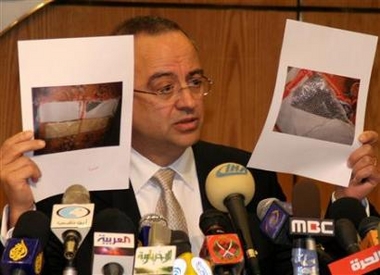|
Al-Zarqawi setting sights beyond Iraq
(AP)
Updated: 2005-11-14 08:44
Abu Musab al-Zarqawi is on the move, or at least that's the message he wants
to send. With Wednesday's attacks in his birthplace of Jordan, the al-Qaida in
Iraq chief signaled he has the capacity and desire to export his suicide-bombing
campaign outside Iraq's borders.
Now, many in the already volatile Middle East worry his stated goals of
toppling pro-American Arab rulers, erecting an Islamic caliphate and targeting
Israel may be gaining momentum.
His threat is not new to the region, but the three fiery hotel blasts that
killed 57 people in one of the Mideast's most secure cities sparked instant
calls for regional and international efforts to fight terror.

Jordanian Deputy Prime Minister Marwan
al-Muasher holds pictures showing the explosive devices worn by a woman in
Amman November 13, 2005.[Reuters] | Officials in
Iraq, where al-Zarqawi's bloody campaign is known all too well, repeated
warnings that terrorism will only keep spreading in the Mideast, unless
countries work harder to help Iraq end its raging insurgency.
Iraqi Defense Minister Saadoun al-Dulaimi warned Arab states that "if the
Iraqi volcano explodes, no neighboring capital will be saved."
"I told the world and neighboring countries 'Don't make Iraq a hub for
terrorism,'" he said in Amman on Sunday.
Most regional analysts and officials say they believe the U.S.-led war in
Iraq has in fact created and worsened — not stamped out — a breeding ground for
terrorism.
"It's like a franchise operation. You have second-generation jihadist groups
all across the world," US Senator Pat Roberts said Sunday. The threat that
al-Zarqawi will set up terror fronts beyond Iraq's borders is "extremely
serious."
In Iraq itself, violence continues despite repeated large-scale operations to
try to wipe out terror strongholds. And the insurgency shows a level of
resilience and even a spare capacity to send forces abroad.
"Al-Zarqawi has proved a very fundamental point, that the Americans can't
control al-Qaida in Iraq," said Mustafa Alani, an Iraqi senior security analyst
with the Dubai-based Gulf Research Center. "Iraq is no longer a magnet
attracting terrorism, but it is now exporting terrorist forces."
Significantly, al-Zarqawi demonstrated with the Amman attacks that he has at
least some Iraqis, and not just foreign fighters, on his side.
The three suicide bombers who died in the Grand Hyatt, Radisson SAS and Days
Inn attacks were Iraqis, as was the wife of one of the men, who failed in her
attempt to blow herself up and was arrested Sunday.
Some, however, cast doubt on whether al-Zarqawi had the ability to wage a
wider war and whether the Amman attacks were a sign of worse to come.
"One event does not mark a trend, and Jordanian security repeatedly blocked
prior attack attempts," said Anthony Cordesman, a military analyst at the Center
for Strategic and International Studies in Washington. "It is also important to
note that it is far from clear that al-Zarqawi has a broad network."
Some speculate that Sunday's capture of 35-year-old Sajida Mubarak Atrous
al-Rishawi, the suicide bomber's wife and the sister of a slain al-Zarqawi
lieutenant in Anbar, may motivate al-Qaida to launch fresh attacks here.
But al-Zarqawi has plenty of reasons to seek new battlegrounds here and
further field.
The 38-year-old militant holds a special grudge against U.S.-allied Jordan,
which has handed down several death sentences against him for terror crimes,
such as the 2002 slaying of an American diplomat.
There is also Jordan's moderate brand of Islam — at odds with al-Zarqawi's
hard-line Salafist Sunni Muslim approach — and Jordan's 1994 peace treaty with
Israel.
Jordan also jailed him for several years for terror-related crimes before
letting him leave in 1999 to Afghanistan.
There, al-Zarqawi trained in explosives, searched for somewhere to stamp his
own brand of terror and — after slipping through Iran — entered northern Iraq
before the 2003 U.S.-led invasion to topple Saddam Hussein.
While his commitment to waging his terror campaign in Iraq seemed
unparalleled, Iraq may in the end prove just the beginning, says Alani.
"Al-Zarqawi is competing with the al-Qaida headquarters," he said. "With the
Amman attacks, he has now proved that the brand in Iraq is able to carry out
operations on a regional scale."
In October, the U.S. government released a letter purportedly from Osama bin
Laden's deputy, Ayman al-Zawahri, urging al-Zarqawi to expand his insurgency
into neighboring Muslim countries. Al-Qaida claimed it was fake.
August's rocket attacks in Jordan's Red Sea port of Aqaba were a taste of
what was to come. Two Katyusha rockets were fired at — but missed — U.S. Navy
ships docked in Aqaba, while another slammed into the nearby Israeli port of
Eilat.
Two attacks in Egypt's Sinai Peninsula killed about 100, including Israeli
tourists, and were claimed by several groups, including al-Zarqawi's.
Jordan's renowned intelligence services have foiled numerous al-Zarqawi
terror plots here, including a planned 2004 chemical attack targeting the
kingdom's security headquarters. But officials admit it was only a matter of
time before a successful attack.
Says Labib Kamhawi, a Jordanian terror analyst: "Al-Zarqawi is gaining
momentum and getting more sophisticated."
|